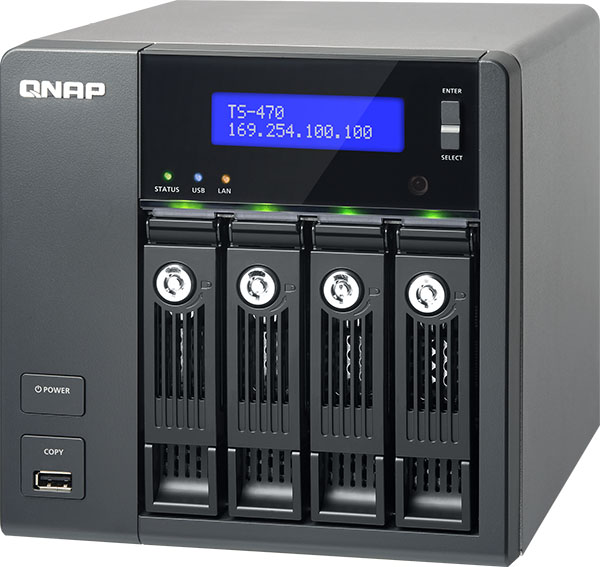QNAP TS-470 NAS Review: Four GbE Links, With 10 GbE Scalability
Armed with a Sandy Bridge-based Celeron CPU, QNAP's TS-470 handles the traffic from four gigabit Ethernet connections. Or, with the addition of a 10 GbE upgrade card, it can be made to push well over 1 GB/s, providing you use the right storage.
Gigabit Ethernet With Room To Grow
Most small and home office network-attached storage appliances are fairly similar in the feature sets and performance they offer at relatively comparable prices. So, what extras might you expect if you spend a little more on something higher-end? We recently received QNAP's TS-470, which falls into the category of a more feature-rich, but also pricier unit. At its heart is a Sandy Bridge-based Intel Celeron G550, a 2.6 GHz dual-core processor with a maximum TDP of 65 W and on-board HD Graphics able to hit 1 GHz. QNAP attaches 2 GB of DDR3 memory to the Celeron, which can be expanded to as much as 16 GB.
But those specs aren't what makes the TS-470 noteworthy. Rather, it's the appliance's four gigabit Ethernet ports, two of which are enabled through an expansion card, that make it different. And if GbE isn't enough for you, the add-in card can be swapped out for a 10 GbE option. With link aggregation enabled, QNAP claims you can get up to 432 MB/s writes and 450 MB/s reads. Or, with the 10 GbE board, writes should be able to hit 1.67 GB/s with reads topping out at 1.7 GB/s.
Naturally, hitting those rates requires the right storage devices. But you can expand the TS-470's capacity up to 144 TB by adding as many as 36 additional disk drives.
While you ponder the possibilities of that much storage, bear in mind that this NAS unit also sports an HDMI output. What's that good for? A direct connection to your TV, serving as a media server? Or how about in a medium-sized business, streaming video presentations into the board room? Frankly, most of would probably prefer to keep our servers and theaters separated by more than just an HDMI cable. However, video output is becoming an increasingly common feature, too.
QNAP TS-470 Technical Specifications
| CPU | Intel Celeron G550 (Sandy Bridge), dual-core, HD Graphics |
|---|---|
| Clock Rate | 2.6 GHz |
| RAM | 2 GB DDR3 (up to 16 GB through expansion) |
| Storage | 4 x 2.5"/3.5" SATA 6Gb/s or 3Gb/s storage (SSDs and hard drives) |
| Up to 16 TB (with 4 TB hard drives) | |
| Connections | 4 x gigabit Ethernet (two integrated; two via expansion card); 10 GbE-ready1 x USB 2.0 (front)2 x USB 2.0 (back)2 x USB 3.0 (back)1 x HDMI 2 x eSATAAudio in/out |
| Status Indicators | LCD, Status LEDs |
| Dimensions (HxWxD) | 6.97” x 7.09” x 9.25” / 17.7 x 18.0 x 23.5 cm |
| Weight | 8.3 lbs / 3.75 kg |
| Price | $1000 |
Get Tom's Hardware's best news and in-depth reviews, straight to your inbox.
Current page: Gigabit Ethernet With Room To Grow
Next Page A Familiar Chassis And More Modern Software Platform-
Someone Somewhere V4 of the software looks nice, but is hell to use. What idiot tries to build a window manager in JS?Reply
The previous generation had a USB3.0 port on the front, wonder why they went back to two?
Also, if my TS-559 Pro II is anything to go by, these things really can't handle dust. -
sharkie8 Agree with previous comment, it's difficult to use depite the looks.Reply
Although TS-470 has a good potential to be upped with an i7 processor and 16 GB ram if you're willing to void the warranty. There's an article showing how to do it... -
gsxrme 4 Drive fail, If the drives are in raid 5, then were talking 300MB/s transfer max. 4 NIC team doesn't matter unless were talking 8+ drives and 1 hell of a switch.Reply
TD430 running x8 WD 4TB Reds in raid 5 with 2 LANs in Team yielded 700MB/s with 20TB raid array allocation.
This NAS is junk with crap transfer -
kalmquist It's strange they used a discontinued CPU in this product. They could have gone with a G1610 (Ivy Bridge, 2.6Ghz, released in first quarter 2013) for the same price.Reply
-
Haravikk I'm not so sure the HDMI port being connected to your TV is much of a selling point at $1,000! With the size of the device you could pretty much emulate it with a Mini-ITX motherboard, four bay hard drive backplane (the QNAP bays look almost exactly like one of the IcyBox models) and you can fairly easily pick up a good gigabit Ethernet card. The only thing the QNAP really does that you can easily do yourself is the case, but if you're only concerned with features then any decent Mini-ITX case with room for the drives, or back-planes + drives, ought to do just fine.Reply
So ehm… yeah, other than the custom case I'm not really convinced this is great value for money at all. -
palladin9479 This is stupidly overpriced. You can build something identical to this for about $300~500 USD. I actually build these all the time for various people, it's nothing but mini-ITX parts put together with an PCI-e network card plugged in.Reply -
Duckhunt You can get the OS afterward from syntology if you go it your own build. I am disappointed that they picked such a weak cpu. At least go for something that is not only low powered but 22nm. Come on.Reply -
nasukaren RAID5 ... boring.... give me RAIDZ2 anytime. But with only 4 disks, not worth using Z2. Why don't these manufacturers realize that RAID5 is dead and give us boxes with 6 drives?Reply
